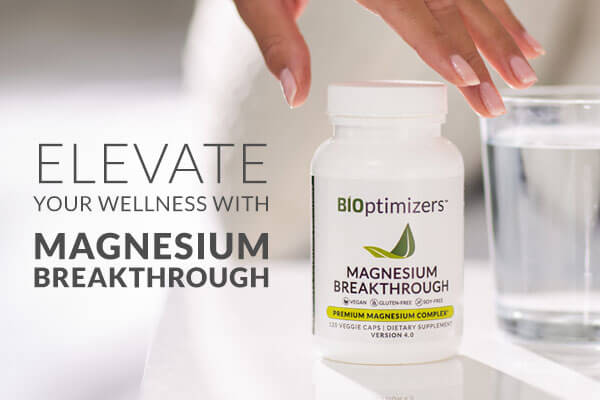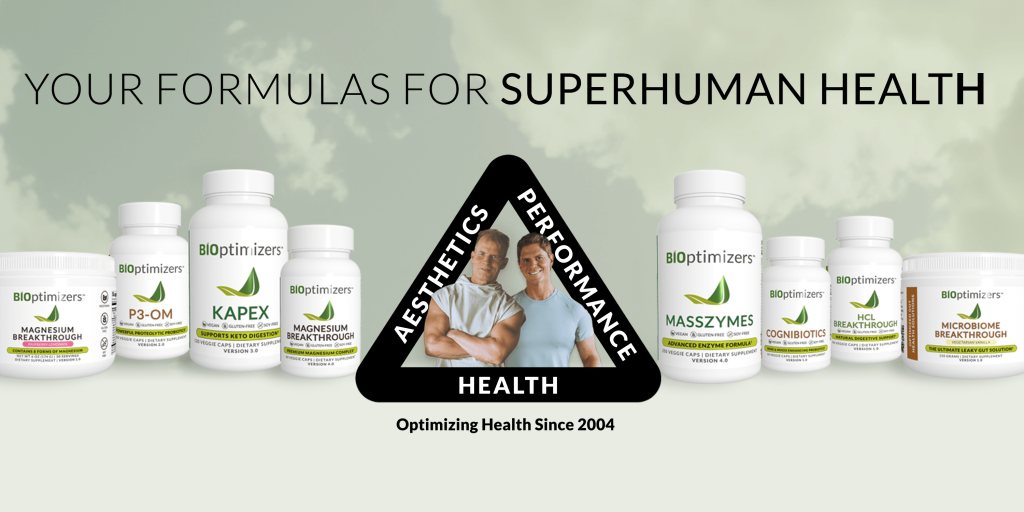
Does Magnesium Increase Testosterone?


Does Magnesium Increase Testosterone?
For many men, low energy, age-related strength loss, and declining stamina can be signs of hormonal imbalances, notably lower testosterone levels. While experts often suggest lifestyle changes and various supplements to help, magnesium is increasingly considered for its potential to support hormone health.
In this article, we’ll explore whether magnesium can boost testosterone, examine the science behind this connection, and see if it might be a key player in restoring hormonal balance.

What Causes Low Testosterone?
Low testosterone can result from various factors, each disrupting energy levels, muscle strength, and overall vitality. Understanding what contributes to these hormonal shifts makes it easier to address the imbalances and take action.
Age
Declining testosterone is a natural part of aging. Suboptimal testosterone levels can begin as early as your 30s or 40s, although at what age and how quickly it declines varies by individual.
A longitudinal study of men ages 40-70 analyzed trends in testosterone levels in the blood. Researchers followed over 1,000 men for seven to ten years. On average, participants’ total testosterone levels declined 0.8% per year.
When you have a testosterone blood test, there can be:
- Free testosterone: not bound to any protein, making the hormone available for use
- Bound testosterone: testosterone attached to binding proteins albumin or sex hormone-binding globulin (SHBG)
- Total testosterone: refers to both protein-bound and free testosterone
SHBG and albumin are proteins that transport testosterone in the blood, but they bind differently. SHBG binds very tightly to testosterone, making it less available for the body to use. In contrast, albumin binds more loosely, allowing testosterone to be more readily available.
When SHBG levels increase, more testosterone becomes tightly bound and unavailable, reducing the amount of free, usable testosterone. This can affect hormone levels even if total testosterone remains unchanged.
In the study, the more bioavailable forms—free and albumin-bound testosterone—dropped by about 2%, while SHBG increased by 1.6% annually. This increase in SHBG indicates reduced availability of free testosterone.

Researchers also noted that being in good health—meaning no chronic illnesses, prescription medications, overweight, or heavy drinking—boosted the levels of several hormones, including testosterone, by 10-15% and reduced the typical decline seen with age.
So, what’s going on in the body that contributes to this natural decline? The primary cause seems to be the reduced ability of Leydig cells in the testes to produce testosterone. This happens because, as you age, your Leydig cells become less responsive to luteinizing hormone (LH), which normally triggers testosterone production in the testes.
As Leydig cells age, increased oxidative stress disrupts essential processes such as cAMP production—needed for cell signaling to stimulate testosterone production—and cholesterol transport, which is crucial for maintaining cellular balance. These disruptions weaken the cells’ overall ability to produce testosterone effectively.
In addition to oxidative stress, aging also leads to a decline in the proteins responsible for moving cholesterol into the mitochondria, a vital step in steroid hormone production. Reduced enzyme activity further compounds this, diminishing the conversion of cholesterol into testosterone and other steroid hormones, resulting in lower testosterone levels.
Finally, age-related changes in the hypothalamic-pituitary-adrenal (HPA) axis, which regulates hormone levels and stress response, also affect testosterone production. The HPA axis controls testosterone by releasing hormones that signal the testes to produce it. As men age, the HPA axis becomes more sensitive to testosterone, creating a negative feedback loop. This increased sensitivity causes the HPA axis to reduce the release of hormones that stimulate testosterone production, leading to lower testosterone levels.
Weight Gain

While testosterone declines naturally with age, other factors, like weight gain, may exacerbate it.
Weight gain can disrupt hypothalamic function, decreasing luteinizing hormone (LH) secretion. Since LH is crucial for stimulating testosterone production, lower levels of LH can result in reduced testosterone.
In contrast, losing weight can help reverse this hypothalamic dysfunction. Weight loss often restores normal LH levels, which stimulate increased testosterone production.
The extra body fat that comes with carrying around extra weight can also contribute to decreased testosterone due to aromatization. Aromatization is the process where the enzyme aromatase converts testosterone into estrogen.
Higher aromatase activity in fat tissue increases the conversion of testosterone to estrogen, leading to lower testosterone levels and some estrogen-related symptoms. This conversion also triggers a feedback loop that slows down the body’s production of testosterone.
A longitudinal study of nearly 2,395 European men ages 40-79 explored lifestyle and health factors affecting hormone changes. Researchers found that gaining 10% or more in body weight was associated with a decrease in testosterone levels by an average of 2.4 nmol/l (69 ng/dL), significant compared to men who kept their weight stable.
Conversely, losing 10% or more of body weight led to an average increase in testosterone levels of 2.9 nmol/l (84 ng/dL). Researchers observed this effect regardless of the initial weight. Therefore, maintaining a healthy weight could be crucial for optimal testosterone levels. Men closer to their ideal weight might not need to lose as much to see similar improvements.
A meta-analysis of 24 studies highlighted this relationship by focusing on those on a weight loss diet or undergoing bariatric surgery. Both interventions resulted in weight loss and an increase in testosterone levels.
For those on a low-calorie diet, the average 9.8% weight loss was linked to a testosterone increase of 2.9 nmol/L (84 ng/dL). In the bariatric surgery studies, the average 32% weight loss was linked to a testosterone increase of 8.7 nmol/L (251 ng/dL).
While these studies are not causal, they highlight a clear association between weight loss and increased testosterone levels. This suggests that weight management can be a significant factor in improving testosterone levels.
Poor Sleep

Not getting enough high-quality sleep affects everything, including your testosterone levels. Sleep deprivation is widespread in modern societies, and since a significant portion of daily testosterone release occurs during sleep, inadequate sleep can lead to lower testosterone levels.
A controlled study explored the impact of 24 hours of sleep loss on testosterone levels. After 24 hours of sleep loss, participants had 23% decreased testosterone levels compared to the control group, which experienced a 3% increase in testosterone. Sleep deprivation was associated with an overall 27% decrease in testosterone levels.
Another study investigated the effects of one week of sleep restriction on testosterone levels in young, healthy men. Participants slept for less than five hours a night for eight nights. With sleep restriction, daytime testosterone levels decreased by 10-15%.
Now, let’s say you are already an aging man and your levels are naturally declining. If poor sleep led to this in healthy young men, the impact could be even more pronounced for someone with age-related declines.
Another study explored the effects of sleep loss on testosterone levels in aging men, ages 64-74. Researchers measured nightly sleep time and morning testosterone levels for three days. They determined that the amount of sleep older men get at night is a strong indicator of their testosterone levels in the morning.
While the participants’ sleep duration and quality varied considerably, more sleep was consistently associated with higher testosterone levels.
Can Magnesium Help Support Testosterone Levels?
Now we get to the reason you’re here: to explore whether supplementing with magnesium can help support testosterone levels. The short answer is yes! Let’s look at some studies to see how.
Whether you’re an athlete or not as active, magnesium supplementation may help increase your testosterone.
A study aimed to assess the effects of magnesium supplementation and exercise on free and total plasma testosterone levels in athletes and sedentary individuals. The study included three groups: sedentary participants supplemented with magnesium, tae kwon do athletes supplemented with magnesium, and tae kwon do athletes without magnesium supplementation.

Participants supplementing with magnesium took 4.5 mg/lb, or 10 mg/kg. Whether sedentary or exercising, they experienced an increase in testosterone levels. Researchers observed the most significant increase in the group that exercised along with the supplementation.
Another study explored a possible connection between magnesium serum levels and testosterone levels. Researchers evaluated 399 Italian men aged 65 years and older. Higher magnesium levels were linked to higher testosterone levels, even after accounting for other factors that could influence this relationship, such as age, body mass index (BMI), and other health conditions.
This suggests that maintaining optimal magnesium levels might also support healthy testosterone levels.
Magnesium May Increase Testosterone Availability
Magnesium may play a role in how much testosterone your body can use by affecting how it binds to proteins in the blood.
SHBG (sex hormone-binding globulin) helps control testosterone levels by attaching to it in the blood. Most of the testosterone is tied up with SHBG and can’t be used by the body, while only a small amount stays free and active. Magnesium might help change how tightly testosterone sticks to SHBG. When magnesium levels are normal, this could help make more testosterone available for the body to use.
Serum albumin is another protein that carries testosterone but holds onto it more loosely. Magnesium and DHEA (another steroid prohormone) can move testosterone away from serum albumin, which could lead to more active testosterone in the body. Scientists think this is one way magnesium supplements might help increase testosterone levels, especially with DHEA, but more research is needed.
Supports Healthy Sleep

We discussed earlier how poor sleep can lead to low testosterone levels. Magnesium may also support healthy testosterone levels by helping you get a better night’s rest.
Magnesium plays a key role in promoting better sleep by supporting relaxation, a healthy stress response, and increasing deep, restorative sleep. Studies show magnesium can improve sleep quality, especially in the elderly, by helping them fall asleep faster and sleep longer.
For a deeper dive into how magnesium supports sleep, check out our full article and find out how much magnesium you need for sleep.
Supports Weight Loss
While ultimately to lose weight, there’s no avoiding maintaining a caloric deficit for real results. In addition, addressing any magnesium deficiency could support your weight loss goals, and, as we know from above, weight loss could mean increased testosterone levels.
Magnesium can support weight loss in several ways. It may help improve your metabolic health, including insulin sensitivity, blood pressure, and triglyceride levels. Magnesium also supports healthy blood sugar levels, which can prevent excess fat storage.
In one study, participants supplementing with magnesium had smaller waist sizes than the control group, particularly in individuals with higher body mass.
Additionally, it helps support a healthy stress response and reduces cortisol levels, which are associated with weight gain, particularly in your belly. Helping minimize belly fat accumulation can also lower aromatase activity. This means less testosterone is converted into estrogen, potentially further supporting healthy testosterone levels as you lose weight.
Learn more about how magnesium may support weight loss in our blog post.
Other Supplements That May Support Healthy Testosterone Levels

Magnesium isn’t the only supplement that supports healthy testosterone levels. Let’s take a look at a couple of others.
Vitamin D
Having a deficiency in vitamin D may contribute to lower testosterone levels. This makes sense because both vitamin D and testosterone are steroid hormones. Low vitamin D could mean less resources to produce testosterone.
A study of over 2,000 men explored the relationship between vitamin D and testosterone levels. Men with vitamin D levels of 30 µg/L or higher had significantly higher testosterone levels than men with lower vitamin D (20-29.9 µg/L) or deficient levels (below 20 µg/L). Both vitamin D and testosterone levels showed a similar seasonal pattern, with the lowest levels in March and the highest in August.
It is unclear whether vitamin D levels actually affect testosterone levels. Studies exploring the effects of supplementing with vitamin D on testosterone levels provide mixed results.
In a study of 54 men taking 3,332 IU of vitamin D daily for a year, both groups started with low vitamin D (< 50 nmol/L or < 20 ng/mL) and testosterone levels at the lower end of normal (9.09-55.28 nmol/L or 261-1593 ng/dL).
The vitamin D group saw their vitamin D levels increase by 53.5 nmol/L (21.4 ng/mL), while the placebo group had no change. In the vitamin D group, total testosterone increased from 10.7 to 13.4 nmol/L (308 to 387 ng/dL), along with increased bioactive and free testosterone. There were no changes in the placebo group, suggesting vitamin D may boost testosterone.
Another study, however, did not find a change in testosterone with vitamin D supplementation. In this study, 98 men with normal testosterone levels took 2,857 IU of vitamin D daily for 12 weeks. There was no increase in testosterone levels at the end of the trial.
Finally, a study of 55 healthy men practicing strength training explored the effects of vitamin D supplementation on testosterone levels. For 12 weeks, participants took 2,000 IU of vitamin D daily. While about half of the participants experienced a slight increase in testosterone, it was not significant.
While we can’t draw a definitive conclusion about vitamin D supplementation and testosterone levels, it’s worth noting that in the two studies where participants saw no increase in testosterone, their levels were already normal at the start. In contrast, the first study we discussed involved participants with low testosterone at baseline.
A great place to start is talking with your health practitioner, testing for any deficiencies, including vitamin D, and proceeding from there.

Zinc
Zinc is important in supporting normal testosterone levels due to its importance in testosterone synthesis. The process of converting testosterone into its active form, dihydrotestosterone (DHT), needs an enzyme called 5alpha reductase, which relies on zinc to work properly.
A review of studies focused on the relationship between zinc and testosterone levels found that being deficient in zinc can lower testosterone levels in men while taking zinc supplements can raise them.
One study explored the effects of zinc supplementation on testosterone levels. Eighteen zinc-deficient men, ages 50-80, took 30 mg of zinc gluconate daily for six months. Participants supplementing with zinc experienced increased serum testosterone from 8.3 nmol/L (240 ng/dL) to 16.0 nmol/L (461 ng/dL).
Zinc Magnesium Aspartate
Now that you know that zinc may also support testosterone levels, if you’ve heard of ZMA (zinc magnesium aspartate), you may be wondering how effective it is at increasing testosterone levels. Let’s take a look.
It’s important to note that studies largely focus on strength-trained young adults who have yet to experience the natural decline in testosterone that comes with aging. The results aren’t clearly positive in this age group.
In one study, non-zinc deficient young adult males aged 22-23 took a ZMA supplement, including 30 mg of zinc and 450 mg of magnesium aspartate daily for eight weeks. While those supplementing with ZMA significantly increased serum zinc levels, there was no significant change in testosterone levels.

Another study tested the same supplement but got different results. Fifty-seven male university students took ZMA for eight weeks. Participants supplementing with ZMA experienced increased free testosterone levels from 132.1 to 176.3 pg/mL, while the placebo group experienced a decrease from 141.0 to 126.6 pg/mL.
The similar test conditions raise questions about the differences in results. Individual variability in zinc and magnesium metabolism or baseline hormone levels could be factors.
These mixed outcomes suggest that ZMA’s effect on testosterone depends on individual physiology, requiring more research for clarity.
Young, strength-trained individuals might already have optimized hormone levels, limiting the potential for further improvement through supplementation. This contrasts with populations that may see more pronounced benefits, such as older adults or those with low baseline zinc or testosterone levels.
Conclusion
The bottom line is that deficiencies in key nutrients can disrupt your body’s balance and prevent it from functioning optimally. This seems to hold true for the relationship between magnesium, zinc, and testosterone levels.
If you’re aiming to boost testosterone, a smart first step is to get tested for zinc and vitamin D deficiencies. Then, work with your healthcare provider to find the right supplement plan to restore balance. Since there’s no perfect test for magnesium levels and more than half the population is deficient, most people benefit from just introducing a magnesium supplement.
Consider taking a full-spectrum magnesium supplement like Magnesium Breakthrough to help address a magnesium deficiency and support healthy testosterone levels.
References
- Zirkin BR, Tenover JL. Aging and declining testosterone: past, present, and hopes for the future. J Androl. 2012;33(6):1111-1118. doi:10.2164/jandrol.112.017160
- Feldman HA, Longcope C, Derby CA, et al. Age trends in the level of serum testosterone and other hormones in middle-aged men: longitudinal results from the Massachusetts male aging study. J Clin Endocrinol Metab. 2002;87(2):589-598. doi:10.1210/jcem.87.2.8201
- Colleluori G, Chen R, Turin CG, et al. Aromatase inhibitors plus weight loss improves the hormonal profile of obese hypogonadal men without causing major side effects. Front Endocrinol (Lausanne). 2020;11:277. doi:10.3389/fendo.2020.00277
- Camacho EM, Huhtaniemi IT, O’Neill TW, et al. Age-associated changes in hypothalamic-pituitary-testicular function in middle-aged and older men are modified by weight change and lifestyle factors: longitudinal results from the European Male Ageing Study. Eur J Endocrinol. 2013;168(3):445-455. doi:10.1530/EJE-12-0890
- Corona G, Rastrelli G, Monami M, et al. Body weight loss reverts obesity-associated hypogonadotropic hypogonadism: a systematic review and meta-analysis. Eur J Endocrinol. 2013;168(6):829-843. doi:10.1530/EJE-12-0955
- Cote KA, McCormick CM, Geniole SN, Renn RP, MacAulay SD. Sleep deprivation lowers reactive aggression and testosterone in men. Biol Psychol. 2012;92(2):249-256. doi:10.1016/j.biopsycho.2012.09.011
- Leproult R, Van Cauter E. Effect of 1 week of sleep restriction on testosterone levels in young healthy men. JAMA. 2011;305(21):2173-2174. doi:10.1001/jama.2011.710
- Penev PD. Association between sleep and morning testosterone levels in older men. Sleep. 2007;30(4):427-432. doi:10.1093/sleep/30.4.427
- Cinar V, Polat Y, Baltaci AK, Mogulkoc R. Effects of magnesium supplementation on testosterone levels of athletes and sedentary subjects at rest and after exhaustion. Biol Trace Elem Res. 2010;140(1):18-23. doi:10.1007/s12011-010-8676-3
- Maggio M, Ceda GP, Lauretani F, et al. Magnesium and anabolic hormones in older men. Int J Androl. 2011;34(6 Pt 2):e594-600. doi:10.1111/j.1365-2605.2011.01193.x
- Maggio M, De Vita F, Lauretani F, et al. The interplay between magnesium and Testosterone in modulating physical function in men. Int J Endocrinol. 2014;2014:525249. doi:10.1155/2014/525249
- Abbasi B, Kimiagar M, Sadeghniiat K, Shirazi MM, Hedayati M, Rashidkhani B. The effect of magnesium supplementation on primary insomnia in elderly: A double-blind placebo-controlled clinical trial. J Res Med Sci. 2012;17(12):1161-1169.
- Rodríguez-Moran M, Guerrero-Romero F. Oral magnesium supplementation improves the metabolic profile of metabolically obese, normal-weight individuals: a randomized double-blind placebo-controlled trial. Arch Med Res. 2014;45(5):388-393. doi:10.1016/j.arcmed.2014.05.003
- Askari M, Mozaffari H, Jafari A, Ghanbari M, Darooghegi Mofrad M. The effects of magnesium supplementation on obesity measures in adults: a systematic review and dose-response meta-analysis of randomized controlled trials. Crit Rev Food Sci Nutr. 2020;61(17):2921-2937. doi:10.1080/10408398.2020.1790498
- Cuciureanu MD, Vink R. Magnesium and stress. In: Magnesium in the Central Nervous System. University of Adelaide Press; 2011.
- Wehr E, Pilz S, Boehm BO, März W, Obermayer-Pietsch B. Association of vitamin D status with serum androgen levels in men. Clin Endocrinol (Oxf). 2009;73(2):243-248. doi:10.1111/j.1365-2265.2009.03777.x
- Pilz S, Frisch S, Koertke H, et al. Effect of vitamin D supplementation on testosterone levels in men. Horm Metab Res. 2010;43(3):223-225. doi:10.1055/s-0030-1269854
- Lerchbaum E, Pilz S, Trummer C, et al. Vitamin D and testosterone in healthy men: A randomized controlled trial. J Clin Endocrinol Metab. 2017;102(11):4292-4302. doi:10.1210/jc.2017-01428
- Wrzosek M, Woźniak J, Włodarek D. The combination of a diversified intake of carbohydrates and fats and supplementation of vitamin D in a diet does not affect the levels of hormones (testosterone, estradiol, and cortisol) in men practicing strength training for the duration of 12 weeks. Int J Environ Res Public Health. 2020;17(21). doi:10.3390/ijerph17218057
- Te L, Liu J, Ma J, Wang S. Correlation between serum zinc and testosterone: A systematic review. J Trace Elem Med Biol. 2022;76:127124. doi:10.1016/j.jtemb.2022.127124
- Prasad AS, Mantzoros CS, Beck FW, Hess JW, Brewer GJ. Zinc status and serum testosterone levels of healthy adults. Nutrition. 1996;12(5):344-348. doi:10.1016/s0899-9007(96)80058-x
- Koehler K, Parr MK, Geyer H, Mester J, Schänzer W. Serum testosterone and urinary excretion of steroid hormone metabolites after administration of a high-dose zinc supplement. Eur J Clin Nutr. 2007;63(1):65-70. doi:10.1038/sj.ejcn.1602899
- Brilla LR, Conte V. Exercise nutrition effects of a novel zinc-magnesium formulation on hormones and strength. Asep.org. Accessed October 3, 2024.
